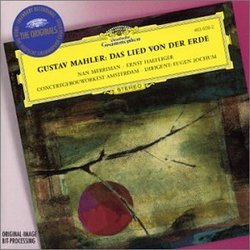| All Artists: Jochum, Merriman, Haefliger, Concertgebouw Orchestra Title: Mahler: Das Lied Von Der Erde Members Wishing: 0 Total Copies: 0 Label: Deutsche Grammophon Original Release Date: 1/1/2001 Re-Release Date: 1/2/2001 Album Type: Import Genre: Classical Style: Number of Discs: 1 SwapaCD Credits: 1 UPC: 028946362822 |
Search - Jochum, Merriman, Haefliger :: Mahler: Das Lied Von Der Erde
 | Jochum, Merriman, Haefliger Mahler: Das Lied Von Der Erde Genre: Classical
|
Larger Image |
CD Details |
CD ReviewsOne of the very best recordings ever of Das Lied, but sadly Sam | 11/19/2007 (5 out of 5 stars) "It looks as if this recording has been ill-fated from first. Though recorded by as great a conductor as Jochum, and published at a time (1963) when Mahler was just beginning to be rediscovered and there were not yet many recordings available (DG had never recorded it before), it has remained confidential among music lovers ever since. It was hardly mentioned in record guides till it was reissued for the first time on CD on some DG European series in the mid-90s. It seemed to be at last recognized for all its value when it was later issued as one of the Originals in 1999, but this CD is sadly now out of print, so let's go back to the beginning again! Ernst Haefliger is simply the best tenor I have ever heard in this work - he knows how to convey the slightest meaning in every of his words, while managing to sound as rude as a drunk man in the first and third of his songs. Another fellow lied singer, Fritz Wunderlich, is generally considered the best tenor to have ever recorded this work, but he sounds pretty mannered (he always was a little, being some kind of tenor equivalent to Fischer-Dieskau) when compared to Haefliger, and his singing is far from being as meaningful! By the way, may I remind you that contrary to what is generally implied in translations of the words, the fifth movement is the song of a man like you and me after he got drunk, not the one of a drunkard creeping on a kerb with his bottle of plonk! You simply need to listen to what he says about the futility and transiency of life to realize how lucid he can be! Despite what is written in the British Penguin CD Guide, Jochum's conducting does not sound Brucknerian at all - it could hardly be in Das Lied anyway! He emerges as a natural Mahlerian, in his only Mahler recording ever, and his partnership with the Concertgebouw (whose history is as you know deeply linked to Mahler's music) is once again an outstanding one. The singing of Nan Merriman (one of those competent but hardly exceptional singers who took part to many of Toscanini's opera recordings on RCA, like Jan Peerce or Rose Bampton for instance) is of lesser distinction however - quite good in the first two alto songs, but failing to convey all the depth of feeling and universal message which are called for in the Abschied. It should however not deter you from listening to this very special recording of Das Lied, just as important as Walter's and Klemperer's! Let's hope it returns to the catalogue one day, and what a pity Jochum never recorded more Mahler!" Consistent and memorable L. Johan Modée | Earth | 08/18/2004 (5 out of 5 stars) "Eugene Jochum is not famous as a Mahler conductor. But his account of Das Lied von der Erde demonstrates that he well could have been one of the great ones. Each movement gets a consistent interpretation, with very fine articulation of significant details. The eruptions and climaxes are convincingly calculated, without interrupting the flow of the music.
Nan Merriman and Ernst Haefliger are soloists - perhaps not the most famous in the Mahler context but they are certainly two voices suitable for this work. Haefliger is both gentle and desperate, and Merriman is attentive to the meaning of the words she sings, with sensitive and intense vibrato. Concertgebouw orchestra is as always a good Mahler orchestra. And the recording is surprisingly clean, dynamic, and spacious for its age. All in all, a memorable interpretation that deserves its place in every serious Mahlerite collection." |

 Track Listings (6) - Disc #1
Track Listings (6) - Disc #1